
NorthTec
Encyclopedia
NorthTec is the largest tertiary education provider in northern New Zealand. NorthTec is the only Northland-based Tertiary Education Institute that provides programmes ranging from foundation, certificate, diploma and degree levels.
Working closely with local and national industries, NorthTec provides practical, quality training that meets Northland’s needs. NorthTec has campuses and learning centres in Whangarei
, Kerikeri
, Rāwene
, Kaikohe
, Kaitaia
and the Rodney District
.
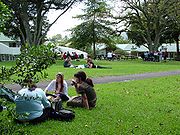 There are about 10,000 students at NorthTec annually. About 40% of the student body claims indigenous Māori ancestry. Māori culture is thus an integral part of NorthTec’s activities. This is reflected in part by the presence of the Te Puna o Te Matauranga Marae (Māori meeting house) complex on the Whangarei campus.
There are about 10,000 students at NorthTec annually. About 40% of the student body claims indigenous Māori ancestry. Māori culture is thus an integral part of NorthTec’s activities. This is reflected in part by the presence of the Te Puna o Te Matauranga Marae (Māori meeting house) complex on the Whangarei campus.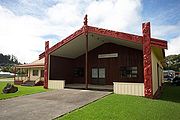 International students from China, Japan, India, the USA, North Africa and a host of other countries take advantage of the English language, hospitality, business, nursing and other quality courses on offer at NorthTec. As most of these students do not have English as a first language and are not used to the local culture, NorthTec has an active International Office to assist. This offers tuition in English and peer mentors who either are familiar with the cultures of East Asia or, where possible, senior students of similar cultural backgrounds.
International students from China, Japan, India, the USA, North Africa and a host of other countries take advantage of the English language, hospitality, business, nursing and other quality courses on offer at NorthTec. As most of these students do not have English as a first language and are not used to the local culture, NorthTec has an active International Office to assist. This offers tuition in English and peer mentors who either are familiar with the cultures of East Asia or, where possible, senior students of similar cultural backgrounds.
Some 40% of the student body attend classes at the main campus located in Whangarei, about 160 km north of Auckland. The remainder attend the regional campuses listed above.
Valley, Whangarei
, on 1 April 1978. As such, its mission was largely to offer trade and community education. The first Chief Executive Officer was Noel Harrison.
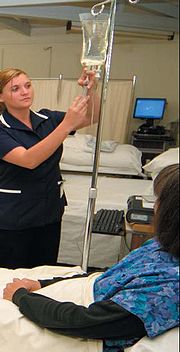 The new college grew rapidly and became instrumental in supplying Refining NZ at nearby Marsden Point, with skilled workers. By 1981, it offered more than 50 skills-training courses. In 1983, the college commenced the phased take-over of nurse training from Northland Base Hospital.
The new college grew rapidly and became instrumental in supplying Refining NZ at nearby Marsden Point, with skilled workers. By 1981, it offered more than 50 skills-training courses. In 1983, the college commenced the phased take-over of nurse training from Northland Base Hospital.
In 1989, the Whangarei District Council set up the Northland University Foundation, with a view to founding a university in Northland. To date, this aspiration has been partially fulfilled. Five university-standard bachelor's degrees are offered. Additionally, many of the degree, diploma and certificate courses can count towards degrees at other institutions (see below).
 By the mid 1980s, competing private bodies were offering trade and community courses in Northland. This was one factor which led the college to change its product offering to include higher and sometimes more academic tuition. As part of this process, it became a polytechnic in 1988 and took the name Northland Polytechnic for the next 17 years. Later in 1988, it was offering degrees and diplomas of a competitive standard.
By the mid 1980s, competing private bodies were offering trade and community courses in Northland. This was one factor which led the college to change its product offering to include higher and sometimes more academic tuition. As part of this process, it became a polytechnic in 1988 and took the name Northland Polytechnic for the next 17 years. Later in 1988, it was offering degrees and diplomas of a competitive standard.
In 1990, negotiations were concluded with the University of Waikato
, which enabled courses taught at Northland Polytechnic, as it was then, to count towards degrees at the University. By 2006, similar arrangements had been concluded with other universities, most notably, Massey University
and Auckland University of Technology
.
To support the enhanced level of learning, the organisation went on a world-wide campaign of staff recruiting. It now has staff with high academic qualifications, including several with masters’ and doctors’ degrees.
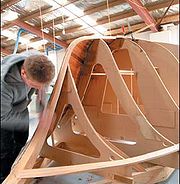 Today NorthTec is governed by a Council, which supports the Chief Executive. The current Council Chair is Vern Dark. NorthTec offers Bachelors degrees in the following areas:
Today NorthTec is governed by a Council, which supports the Chief Executive. The current Council Chair is Vern Dark. NorthTec offers Bachelors degrees in the following areas:
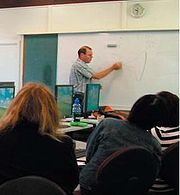 Subject to demand, NorthTec offers certificates and one-year and two year diplomas. A full list of these can be viewed on the NorthTec website. The programmes on offer in 2012 are:
Subject to demand, NorthTec offers certificates and one-year and two year diplomas. A full list of these can be viewed on the NorthTec website. The programmes on offer in 2012 are:
Working closely with local and national industries, NorthTec provides practical, quality training that meets Northland’s needs. NorthTec has campuses and learning centres in Whangarei
Whangarei
Whangarei, pronounced , is the northernmost city in New Zealand and the regional capital of Northland Region. Although commonly classified as a city, it is officially part of the Whangarei District, administered by the Whangarei District Council a local body created in 1989 to administer both the...
, Kerikeri
Kerikeri
Kerikeri, the largest town in the Northland Region of New Zealand, is a popular tourist destination about three hours drive north of Auckland, and 80 km north of Whangarei...
, Rāwene
Rawene
Rawene is a town on the south side of the Hokianga harbour, in Northland, New Zealand. State Highway 12 passes to the south. The town lies at the apex of a peninsula...
, Kaikohe
Kaikohe
Kaikohe is the central service area for the Far North District of New Zealand, about 260 km from Auckland, situated on State Highway 12 at...
, Kaitaia
Kaitaia
Kaitaia is a town in the far north region of New Zealand, at the base of the Aupouri Peninsula which is about 160 km northwest of Whangarei. It is the last major settlement on the main road north to the capes and bays on the peninsula...
and the Rodney District
Rodney District
The Rodney District of New Zealand was a local government area in the northernmost part in New Zealand's Auckland Region, created in 1989 from the amalgamation of Helensville Borough and Rodney County. The seat of the district council is at Orewa, and the district includes Kawau Island to the...
.
NorthTec's Students


Some 40% of the student body attend classes at the main campus located in Whangarei, about 160 km north of Auckland. The remainder attend the regional campuses listed above.
History
NorthTec was originally founded as Northland Community College. This opened with its own campus in RaumangaRaumanga
Raumanga is a suburb of Whangarei in the Northland Region of New Zealand. The main campus of Northland Polytechnic is situated in Raumanga.The population was 4,740 in the 2006 Census, an increase of 282 from 2001.-Education:...
Valley, Whangarei
Whangarei
Whangarei, pronounced , is the northernmost city in New Zealand and the regional capital of Northland Region. Although commonly classified as a city, it is officially part of the Whangarei District, administered by the Whangarei District Council a local body created in 1989 to administer both the...
, on 1 April 1978. As such, its mission was largely to offer trade and community education. The first Chief Executive Officer was Noel Harrison.

In 1989, the Whangarei District Council set up the Northland University Foundation, with a view to founding a university in Northland. To date, this aspiration has been partially fulfilled. Five university-standard bachelor's degrees are offered. Additionally, many of the degree, diploma and certificate courses can count towards degrees at other institutions (see below).

In 1990, negotiations were concluded with the University of Waikato
University of Waikato
The University of Waikato is located in Hamilton and Tauranga, New Zealand, and was established in 1964. It has strengths across a broad range of subject areas, particularly its degrees in Computer Science and in Management...
, which enabled courses taught at Northland Polytechnic, as it was then, to count towards degrees at the University. By 2006, similar arrangements had been concluded with other universities, most notably, Massey University
Massey University
Massey University is one of New Zealand's largest universities with approximately 36,000 students, 20,000 of whom are extramural students.The University has campuses in Palmerston North , Wellington and Auckland . Massey offers most of its degrees extramurally within New Zealand and internationally...
and Auckland University of Technology
Auckland University of Technology
The Auckland University of Technology is a university in New Zealand. It was formed on 1 January 2000 when the Auckland Institute of Technology was granted university status. Its primary campus is on Wellesley Street in Auckland's Central business district...
.
To support the enhanced level of learning, the organisation went on a world-wide campaign of staff recruiting. It now has staff with high academic qualifications, including several with masters’ and doctors’ degrees.
NorthTec Today

- Applied Management (Business);
- Nursing;
- Social Services;
- Applied Arts;
- Sport and Recreation (AUT degree).

- Applied Writing (online diploma)
- Arts (Clay/Glass, Printmaking, Photography, Painting and Design)
- Beauty therapy
- Boat-building
- Business and Business Management
- Computing and Administration (supports current administrative practices and procedures)
- Construction
- Digital Media (provide students with hands on experience in the creation of multi media)
- Engineering (includes automotive, electrical and engineering industry training)
- English Language (intended to assist international students and migrants with English as a second language)
- Environmental Management (minimising the adverse effects humans have on the environment and conservation issues)
- Fashion
- Forestry (includes forest harvesting and silviculture)
- Foundation Studies (supports students seeking entry to tertiary education)
- Hairdressing
- Horticulture (includes sustainable rural development and landscape)
- Hospitality (award winning; use of a fully equipped and functional student restaurant - The Apprentice Restaurant)
- Information Systems
- Te Puna(embraces both Māori culture and language)
- Massage
- Nursing
- Social Services (focus is on putting human science theory into practice in real-life working situations)
- Sport and Recreation
- Tertiary Teaching (adult learning and tertiary teaching, including practical skills)
- Tourism and Travel (trains students to take advantage of New Zealand’s growing tourism trade)

